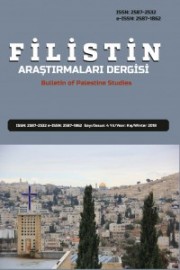İngiliz Kraliyet Raporunda Filistin’e Yahudi Göçleri (1930-1936)
Jewish Immigration into Palestine in the British Royal Report (1930-1936)
Author(s): Macide BaşlamişliSubject(s): Jewish studies, History of Judaism, Interwar Period (1920 - 1939), Migration Studies
Published by: Muhammed Mustafa KULU
Keywords: British; Balfour Declaration; Jewish Immigrations; Mandate;
Summary/Abstract: While the First World War was continuing in 1917, the Middle East, which Muslims considered sacred, were occupied by the British. Palestine was an important region for Muslims, Christians and Jews. The Jews began to dream of a Jewish National Home in Palestine from the beginning of the 19th century, due to their active position in British politics. Of course, such a thought could not be realized under Turkish administration. The British occupation in Palestine gave the Zionists the opportunity to found the “Jewish National Home” that they had long waited for. Thus, under the auspices of the British Military and Mandate Administration in Palestine, mass Jewish immigration, which had not been allowed under Turkish administration, began. The Jewish immigration, known as Aliyah, created an atmosphere of conflict that put an end to the peace that had existed for centuries under the Turkish administration. The political developments in Europe after 1930 quickly increased the Jewish immigration. A large amount of financial capital arrived in Palestine with these immigrations. In the fields of agriculture, industry, education, politics and economy the rift between the Jews and Arabs increased. Many towns, such as Tel Aviv, began to develop rapidly. The Jews grew stronger not only in industry but also in agriculture. Jews bought most of the agricultural land in the hands of the Arabs. The Arabs, who claimed that the migration was an Anglo-Jewish plan, started to react strongly. However, the Arabs did not sufficiently defend their rights because of the divisions among themselves and the Jewish lobby's power in London. Even though the British claimed to have exercised neutral administration, it yielded to the pressures of the Jewish community, which they described as very wealthy and enterprising. Palestinian Arabs were subjected to great injustices in the process leading from the occupation of Palestine to the establishment of the State of Israel. The Arabs launched a struggle in the political and legal fields from 1933 onwards, without achieving any results.
Journal: FİLİSTİN ARAŞTIRMALARI DERGİSİ
- Issue Year: 2018
- Issue No: 4
- Page Range: 42-66
- Page Count: 25
- Language: Turkish

